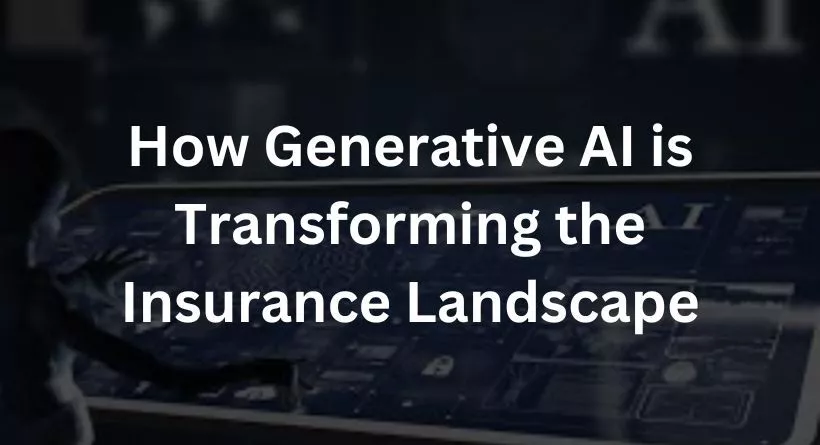
The insurance industry is in the midst of a significant transformation, driven by rapid technological advancements and evolving customer expectations. One technology that is poised to disrupt this traditional sector is generative artificial intelligence (AI).
Generative AI, which encompasses a range of advanced algorithms capable of creating new data from existing data, holds the power to reshape the insurance industry and redefine the way we manage risk. This technology enables machines to learn patterns and generate output that closely resembles human creativity and decision-making. In this article, we’ll explore the various ways generative AI is transforming the insurance landscape, reshaping underwriting, claims processing, risk assessment, and customer service.
The Transformation of the Insurance Industry

The insurance industry has long relied on manual processes, often resulting in delays and inefficiencies. However, with the advent of generative AI, significant changes are on the horizon. Insurers are now exploring ways to harness the power of generative AI to improve efficiency, reduce costs, and provide a more personalized experience for their customers.
You may also like reading: Generative AI Applications in Healthcare: A New Era of Innovation
What is Generative AI?
Generative AI refers to a set of advanced algorithms capable of creating new data by analyzing existing data. This technology empowers machines to learn patterns and generate output that closely resembles human creativity and decision-making.
Generative AI in Insurance
1. Revolutionising Underwriting with Generative AI
Underwriting is a critical process in the insurance industry that involves evaluating risks and determining policy premiums. Traditionally, this has been a time-consuming and labour-intensive task that relies on the expertise of underwriters to analyze large volumes of data and make informed decisions.
Generative AI is set to revolutionize underwriting by automating much of the decision-making process. Advanced algorithms can quickly analyze vast amounts of data, including historical records, policyholder information, and market trends, to identify patterns and make accurate predictions. This allows insurers to assess risks more accurately and efficiently, resulting in faster policy approvals and more competitive pricing.
Furthermore, generative AI can help insurers tailor policies to individual needs, providing a more personalized experience for customers. By analyzing data on policyholder behaviour, preferences, and lifestyles, insurers can develop customized coverage plans that better align with customers’ specific requirements.
2. Streamlining Claims Processing with AI-Powered Automation
Claims processing is another area where generative AI is making a significant impact. Traditionally, claims handling has been a slow and labour-intensive process, with claims processing officers manually reviewing claim submissions and determining payouts. This often leads to delays and inconsistencies in claim settlements, negatively impacting customer satisfaction.
Generative AI has the potential to streamline claims processing by automating much of the manual work. Advanced algorithms can analyze claim submissions, identify patterns and anomalies, and make recommendations for payouts, significantly reducing the time it takes to process claims. Additionally, AI can help detect fraudulent claims, saving insurers significant amounts of money and improving overall efficiency.
3. Enhancing Risk Assessment with AI-Powered Predictive Analytics
Risk assessment is a crucial component of the insurance industry, as insurers must accurately evaluate risks to determine policy premiums and coverage limits. Traditional risk assessment methods often involve analyzing historical data and relying on the expertise of actuaries to make predictions.
Generative AI is transforming risk assessment by leveraging advanced predictive analytics. By analyzing large volumes of data, including demographic information, policyholder behaviour, and external factors such as climate patterns and economic trends, generative AI can make more accurate predictions about future risks. This enables insurers to develop more accurate and dynamic pricing models, ensuring that policy premiums are commensurate with the level of risk.
4. Personalising Customer Service with AI-Driven Chatbots
Customer service is a critical aspect of the insurance industry, as customers expect prompt and accurate assistance with policy inquiries, claims submissions, and other issues. Traditionally, customer service has relied on human agents to handle inquiries, resulting in long wait times and inconsistent service quality.
Generative AI is poised to revolutionize customer service in the insurance industry through the use of AI-driven chatbots. These intelligent virtual assistants can handle a wide range of customer inquiries, providing instant, accurate, and personalized responses. By leveraging natural language processing and machine learning algorithms, chatbots can understand customer needs and provide relevant information and assistance, improving the overall customer experience.
The Future of Generative AI in Insurance

As generative AI continues to evolve, its applications in the insurance industry are set to expand even further.
A. Real-Time Risk Assessment and Dynamic Pricing
Generative AI could enable insurers to assess risks in real-time, continuously updating policy premiums and coverage limits based on changing circumstances. For example, AI algorithms could analyze real-time data from connected devices, such as telematics systems in vehicles or smart home sensors, to dynamically adjust premiums based on policyholder behaviour or external factors like weather conditions.
B. Enhanced Fraud Detection and Prevention
By leveraging generative AI’s ability to analyze vast amounts of data and identify patterns, insurers can further enhance their fraud detection capabilities. Advanced algorithms could detect fraudulent activities with greater accuracy, helping insurers to prevent losses and improve overall efficiency.
C. Data-Driven Product Innovation
Generative AI can help insurers identify emerging trends and customer needs by analyzing vast amounts of data from various sources. This can enable insurers to develop new, innovative products and services that cater to changing customer expectations and capitalize on market opportunities.
D. Improved Decision-Making and Strategy Development
Generative AI can support executives and managers in the insurance industry by providing data-driven insights and recommendations to inform decision-making and strategy development. By leveraging the power of AI, insurance companies can make more informed decisions, optimize their operations, and drive growth.
Conclusion
In conclusion, generative AI is transforming the insurance industry by revolutionizing underwriting, streamlining claims processing, enhancing risk assessment, and personalizing customer service. As this technology continues to evolve, the insurance sector is poised for further advancements, including real-time risk assessment, enhanced fraud detection, data-driven product innovation, and improved decision-making.
FAQs
1. What is generative AI, and how does it benefit the insurance industry?
Generative AI is a set of advanced algorithms that create new data by analyzing existing data. In insurance, it improves efficiency, reduces costs, and provides a more personalized experience for customers.
2. How does generative AI streamline claims processing?
Generative AI automates manual tasks in claims processing, reducing delays, and improving efficiency by identifying patterns and anomalies in claim submissions.
3. What is the future of generative AI in insurance?
The future of generative AI in insurance includes real-time risk assessment, enhanced fraud detection, data-driven product innovation, and improved decision-making.
4. How does generative AI personalize customer service in the insurance industry?
Generative AI-driven chatbots provide instant and personalized responses to customer inquiries, improving the overall customer experience.
5. How can insurance companies benefit from generative AI in terms of risk assessment?
Generative AI leverages advanced predictive analytics to make more accurate predictions about future risks, enabling insurers to develop more accurate and dynamic pricing models.





